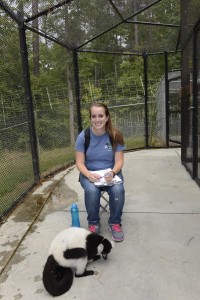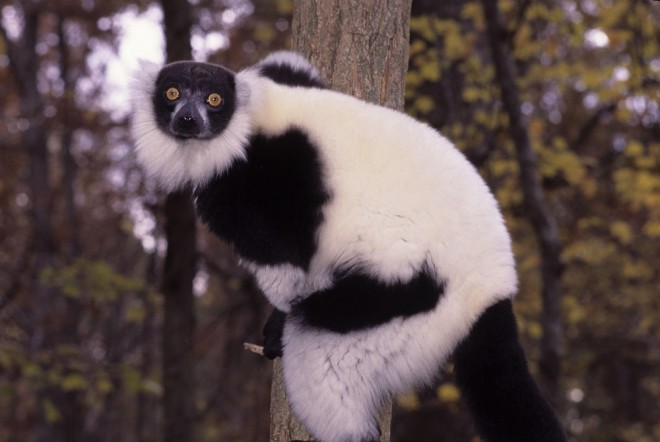August 12, 2014– The Duke Lemur Center offers unique opportunities for undergraduate students to participate in lemur husbandry, research and education during the summer. During their 10-week internships, students learn animal care or research methods and conduct their own independent research projects. DLC volunteer and writer, Mel Norris, followed research intern Melissa Chieffe as she collected data for her research on lemurs as seed dispersers and gave us this report.
When you hear the word conservation, do you think about endangered animals? Not only are endemic plants just as important, but the complex of interactions between plants and animals may be crucial to the survival of both.

Melissa Chieffe, summer research intern, poses along with one of her study subject species, a black & white ruffed lemur. Melissa investigated how well seeds germinated after passing through their digestive tract.
Melissa Chieffe, a summer intern at the Duke Lemur Center, is studying the interaction of two species of large lemurs – Varecia variegata and V. rubra, the ruffed lemurs – and the plants in the forest they inhabit. Specifically, she is looking at how the lemur digestive system affects seed germination. Because of their size, scientists believe that ruffed lemurs may be important seed dispersers in Madagascar, in particular for plants with large seeds, such as some trees. However, they are very sensitive to disturbance, and are usually one of the first species to leave an area after it has been disturbed, by clearing or burning, for example. “If they leave an area, what is the effect on forest regeneration and composition?” asks Melissa. To help answer this question, she has been collecting lemur poop for the past couple of months. She examines some of it to see what seeds are being excreted. The rest gets planted to see what germinates, either in pots in the Duke greenhouses, or outside at the Lemur Center, protected by a wire cage. Tiny strawberry plants have started to grow from the greenhouse pots, but she hasn’t had much luck yet with the outside plots, which have been disturbed by other animals, and colonized by fungi.

Varecia variegata, the black & white ruffed lemurs, have short digestive tracts that allow seeds of fruits pass unscathed by digestion. Melissa Chieffe hopes to study the impact of lemur digestion on forest ecosystems in Madagascar.
Of course, the lemurs’ diet here in North Carolina is very different from what they would eat in the wild in Madagascar, where their diet is up to 70% fruit, but Melissa hopes that this will serve as a preliminary study for further work in the field. She began at Duke in the pre-vet program, but after working as a volunteer in the husbandry department at the Lemur Center for three years, and a semester studying abroad in South Africa, she realized her passion was conservation research. When this study is finished, she is keen to write a grant with her supervisor, Duke Professor Peter Klopfer, to replicate the study in Madagascar. Her enthusiasm is infectious – “I just can’t wait to get out into the field’, she says.

Mel studied forest ecology, botany and entomology at the University of Auckland, in New Zealand. She loves to travel, and has lived in New Zealand, Australia, the UK, France and Seattle, before arriving in North Carolina. She finds lemurs absolutely enchanting.

